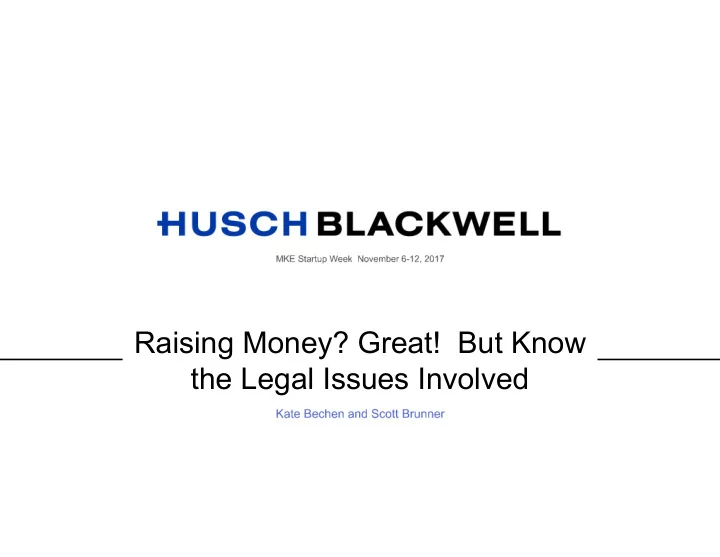

Raising Money? Great! But Know the Legal Issues Involved
OUR TEAM 414.978.5440
Debt vs Equity Debt − Bank Loans • SBA Loan Program SOURCES OF FUNDING: − Bonds • Friends & Family Network − Convertible Notes (initially) • Crowdfunding • Traditional & Nontraditional Equity Lenders • Angel Investors − Joint Venture − Friends & Family Capital Raising − Other Private Placements − SAFE Notes − IPO − This keeps the balance sheet cleaner and prevents costly debt payments, but eats into ownership and voting control. − You can build partnerships with those investing.
Convertible Debt – SAFE Notes – SBA Program Convertible Debt − Short-term debt that converts into equity − Debt is on the books of the company − Investors receive discount for shares upon conversion SAFE (Simple Agreement for Future Equity) − Not actually debt − Early investors are placed on cap table and receive option for future equity holding − Often converts to shares of preferred stock SBA Loan Program − Options under SBA 7a, 504, Microloan & others − May be difficult for startups with zero or limited fixed assets
What Is a “Security”? “Security” as defined by the federal laws: any note, stock, treasury stock, security future, security-based swap, bond, debenture, certificate of interest or participation in any profit-sharing agreement or in any oil, gas, or other mineral royalty or lease, any collateral-trust certificate, preorganization certificate or subscription, transferable share, investment contract, voting-trust certificate, certificate of deposit for a security, any put, call, straddle, option, or privilege on any security, certificate of deposit, or group or index of securities (including any interest therein or based on the value thereof), or any put, call, straddle, option, or privilege entered into on a national securities exchange relating to foreign currency, or in general, any instrument commonly known as a “security”; or any certificate of interest or participation in, temporary or interim certificate for, receipt for, or warrant or right to subscribe to or purchase, any of the foregoing; but shall not include currency or any note, draft, bill of exchange, or banker’s acceptance which has a maturity at the time of issuance or not exceeding nine months, exclusive of days of grace, or any renewal thereof the maturity of which is likewise limited. See 15 U.S.C. § 78c(a)(10). Common Law Test: “The test is whether the scheme involves an investment of money in a common enterprise with profits to come solely from the efforts of others.” SEC v. W.J. Howey Co. , 328 U.S. 293 (1946).
Primary Securities Laws for Issuers Federal Securities Act of 1933 Chapter 551 of the Wisconsin Statutes Securities offerings must be registered with the SEC (or a State) unless an exemption from registration is found Most Securities transactions result in forms filed with the SEC or state divisions of securities even if no registration is required
What Is a Registration Exemption? Type of Offering Who Can Invest? How Much $ Can I Raise? Investors must be sophisticated. No No limit General Private Placement (15 limit on number of investors. U.S.C. § 77d(a)(2)) No limit on form or number of $5 million in 12/month period SEC Regulation 504 investors. Accredited investors plus up to 35 No limit. SEC Regulation 506(b)—common “sophisticated investors.” private placement Accredited investors only. No limit. SEC Regulation 506(c)—general solicitation & advertising Accredited Investors and Unaccredited $1 million in 12/month period SEC Regulation Crowdfunding Investors limited to $2,000 or 5% of net worth. Tier 1 (no limit); Tier 2 (Accredited Tier 1 ($20 million/12 months) SEC Regulation A/A(+) investors plus unaccredited investors Tier 2 ($50 million/12 months) subject to restrictions). Subject to State Regulations. Used for Subject to State Regulations Intrastate Offerings (Section 3(a)(11) Local Friends/Family. of 1933 Act)
Equity What am I selling? LLC: Membership Interests – Or Profits Interests C Corp or S Corp: Common Stock – Or Preferred Shares Partnerships (LP, LLP, General Partnership): Partnership Interests Who am I selling to? Friends & Family Strategic Partners Traditional Private Placements − Broker/Dealers, Networking, Pitch Shows Crowdfunding; Accredited vs Unaccredited Investors The structure of the sale depends largely on the investors involved
What Do I Have to Disclose? Regulators are concerned with individuals using commercial means for fraud or deceit. Less disclosure when only seeking accredited investors. − Why? Accredited investors are more likely able to “fend for themselves”. Common Facts that must be disclosed: − Company structures and ownership − Management − Tax and Accounting History; Books & Records − Business Projections Lenders will require similar disclosures before issuing loans. Lenders make decisions based on the Company’s financial history, its projections, and you.
New Kid on the Block: Securities Crowdfunding *SEC Regulation Crowdfunding Sales of small amounts of *SEC Regulation D, 506(c) securities to a large Usually over the Internet *Wis. Stat. § 551.202(26) number of investors Investment Investor Issuer/Business parties Initial Exchange of $ Funding Portal • Wefunder • CrowdStreet Escrow • RealtyMogul Agent • Craftfund
Crowdfunding Marketplace – Wefunder (registered funding portal)
Wefunder Example
Husch Blackwell’s Startups Team Our team draws on the experience and knowledge of over 700 attorneys firmwide to advise emerging businesses in the following key areas: Business structure and exit strategies Employment Financing Government regulation Intellectual property Mediation, dispute resolution and litigation Real estate Tax To download a copy of this presentation, please visit: www.huschblackwell.com/StartupMKE
Recommend
More recommend